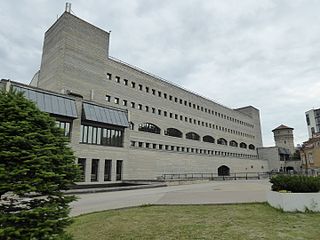Related Research Articles

The National Library of Estonia is a national public institution in Estonia, which operates pursuant to the National Library of Estonia Act. It was established as the parliamentary library of Estonia on December 21, 1918.

Baltic Station is the main railway station in Tallinn, Estonia, and the largest railway station in Estonia. All local commuter, long-distance and international trains depart from the station.
The Estonian Provisional Government was formed on 24 February 1918, by the Salvation Committee appointed by Maapäev, the Estonian Province Assembly.
Sirp is a newspaper published in Estonia. It mostly publishes articles on culture: art, literature, music, film, theatre, and architecture; also articles on sciences and social issues. From 1994 to 1997 the newspaper was issued under the name Kultuurileht.

Robert Kurvitz is an Estonian novelist, video game designer, and musician. He was the lead writer and designer of the 2019 video game Disco Elysium as a founding member of the ZA/UM cultural association and the eponymous video game development company that grew out of it. Kurvitz was fired from ZA/UM in 2022, alongside Disco Elysium's lead art director Aleksander Rostov and Disco Elysium - Final Cut lead writer Helen Hindpere, after the majority stake in ZA/UM was acquired by Estonian businessmen Ilmar Kompus and Tõnis Haavel.
Elsa Ratassepp, was an Estonian stage, radio and film actress whose career spanned six decades.
Ellen Liiger, was an Estonian stage, television, radio and film actress and theatre teacher. Her stage career began at age six and lasted until she died in 1987.
Ingrid Isotamm is an Estonian stage, film, radio and television actress.
Eili Sild is an Estonian stage, film, television and radio actress whose career began on the theatre stage in the early 1960s and has spanned over fifty years.

Dan Põldroos was an Estonian stage, television and film actor who began performing on stage at age fifteen. Although mostly known for comedic roles, he was also an accomplished dramatic actor. Põldroos' career ended at age thirty-seven when he died unexpectedly.
The Pidulik marss is the official honorary march of the President of Estonia which is played as a welcoming/inspection march for the president, who is also the Commander-in-Chief of the Estonian Defence Forces. The march was composed by Estonian musician Eero Liives (1892–1978). Today the march is played by the Kaitseväe Orkester during military reviews of troops such as the Estonian Honour Guard during state visits and the Eesti Kaitsevägi during military parades in Tallinn.
August Peet was an Estonian lawyer and politician. Between 1918 and 1919, he was Minister of Internal Affairs.

Karl Friedrich Luts was an Estonian oil shale chemist and politician.
Harald Alfred Johannes Laksberg was an Estonian teacher and politician.
The Estonian Provincial Government was in office in Estonia from 2–3 August 1917 to 1918, when it was succeeded by Estonian Provisional Government. This provincial government was the executive body for Autonomous Governorate of Estonia.

Artur Vallner was an Estonian educator and politician.

Theodor Rõuk was an Estonian lawyer, politician and soldier.
Ruth Annus is an Estonian civil servant, translator and E-Residency of Estonia specialist.
Merle Silmato is an Estonian opera singer (contralto).
Mats Ekman was an Estonian-Swedish poet from Ätsve in Noaroots parish, Estonia.
References
- ↑ "Eesti rahvusbibliograafia". erb.nlib.ee.
- ↑ "Eesti rahvusbibliograafia". erb.nlib.ee.